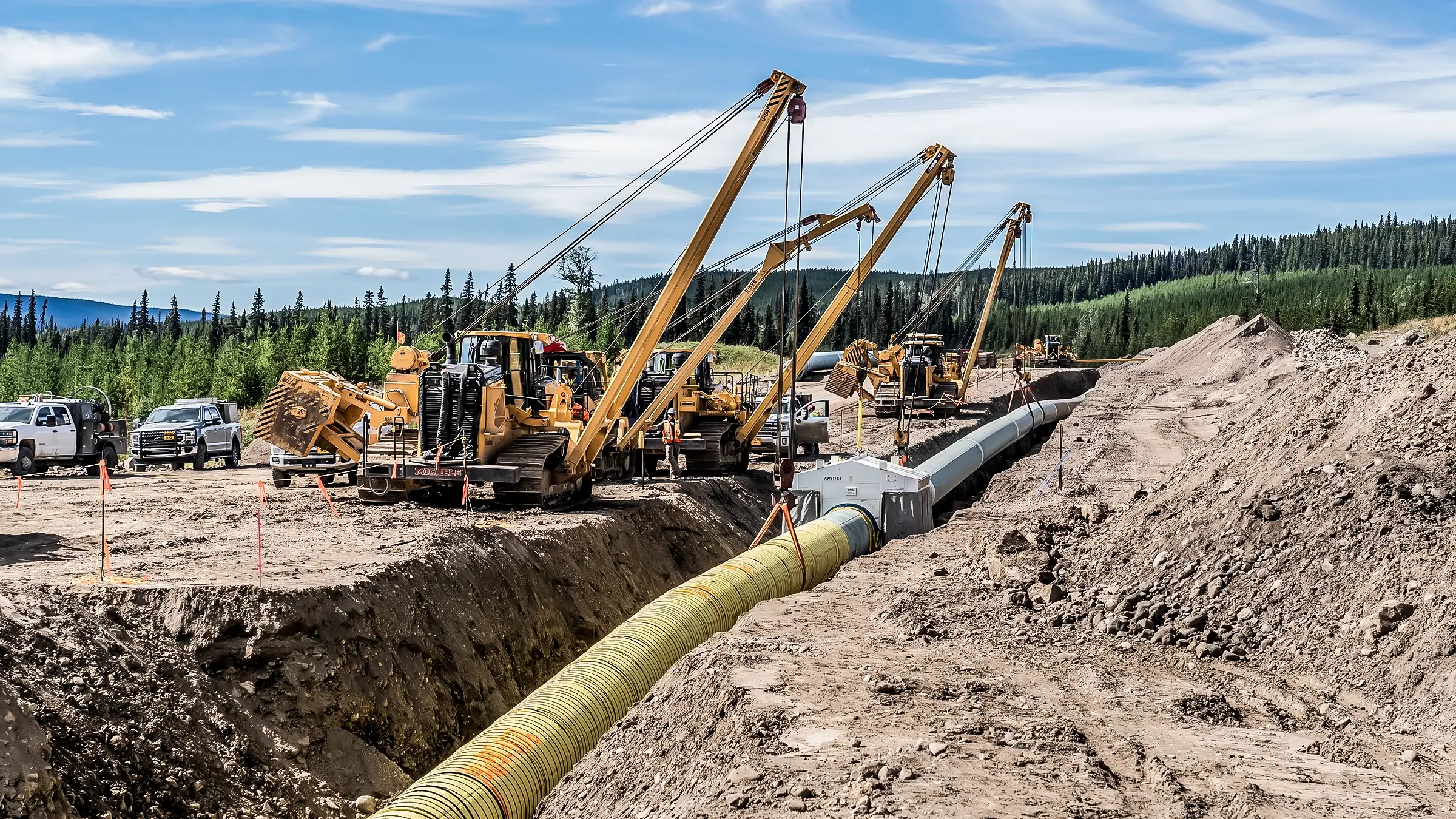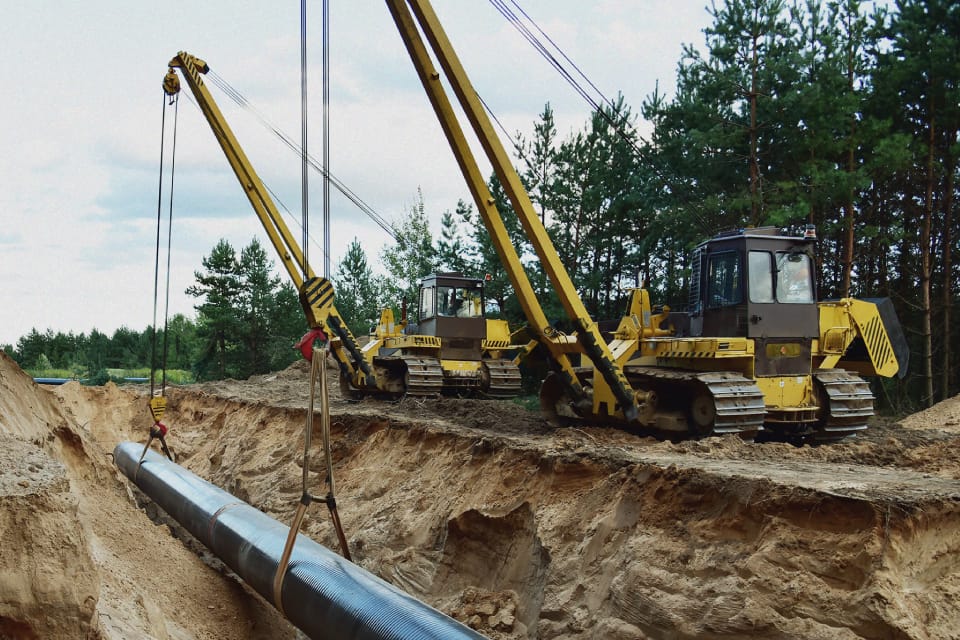Beginner’s Guide to Creek Pipe roustabout Work in Oilfield Operations
Wiki Article
A Deep Study Pipes Installation: Vital Factors and Factors To Consider for Successful Projects
Effective pipe installation is an important facet of design projects. It involves a series of variables, from product option to specific sizing and layout. Each decision can significantly influence the system's performance and long life. Understanding these components is crucial for preventing costly mistakes. Creek Pipe roustabout. As groups navigate with the complexities of installation, a number of essential considerations arise that warrant attention. What are the critical aspects that can make or break a piping job?Understanding Pipe Materials and Their Applications
When selecting pipe materials, one need to think about the specific applications and ecological problems they will deal with. Various products supply distinctive properties that satisfy different needs. As an example, PVC is light-weight and immune to rust, making it excellent for water circulation systems. Alternatively, steel pipelines supply strength and durability, suitable for high-pressure applications but might require protective coatings to avoid rust.Copper pipes are preferred for plumbing because of their antimicrobial residential properties and convenience of installation, while polyethylene is often used in underground applications as a result of its flexibility and resistance to cracking.The option of material additionally hinges on temperature level extremes, chemical direct exposure, and installation location. For high-temperature applications, products like CPVC or PEX can be helpful. Inevitably, understanding the qualities and limitations of each material help in making educated choices that enhance system performance and long life.Importance of Appropriate Sizing and Layout
Appropriate sizing and layout of pipes are crucial for making sure excellent circulation prices and minimizing pressure loss. These aspects also play a considerable duty in establishing the compatibility of products made use of in the installation. A systematic method to sizing and layout can considerably enhance the efficiency and long life of a piping system.Effect On Circulation Rates
Flow prices in piping systems are seriously influenced by the sizing and layout of the pipelines. Appropriately sized pipelines assure that the liquid can move successfully, minimizing turbulence and optimizing flow ability. Oversized pipelines can lead to minimized flow rates, while small pipes might restrict flow, leading to enhanced rubbing and potential clogs. The layout must additionally take into consideration aspects such as pipe material, interior surface level of smoothness, and format, as these add to the overall efficiency of liquid transport. Additionally, the plan of fittings and links within the system can impact flow rates. Precise attention to pipe sizing and layout is necessary for optimizing circulation performance in any kind of piping installation task.Pressure Loss Factors To Consider

Just how can pressure loss significantly impact the performance of a piping system? Pressure loss is a vital element that can substantially decrease the efficiency of fluid transportation systems. When pipelines are incorrectly sized or created, too much pressure loss might occur, resulting in decreased circulation rates and increased energy consumption. This inefficiency can lead to higher functional expenses and possible system failings. Correct sizing and layout are necessary to decrease pressure loss, making sure that liquid dynamics stay optimal throughout the system. Engineers must meticulously take into consideration factors such as pipe diameter, length, and product to accomplish an effective equilibrium. Inevitably, attending to pressure loss during the design phase can enhance reliability and durability, making it indispensable for effective piping tasks.
Product Compatibility Elements
Pressure loss is not the only variable that can affect the efficiency of a piping system; material compatibility additionally plays a considerable duty in overall performance. Ensuring that the products utilized in a piping system are suitable with the liquids they will certainly transport is important. Different products can respond detrimentally to different chemicals, resulting in corrosion, degradation, or contamination. This can eventually compromise the stability of the system and impact its durability. Furthermore, proper sizing and style are necessary to accommodate thermal expansion and contraction, which can further influence product efficiency. Evaluating variables such as temperature level, pressure, and chemical make-up is critical in selecting suitable products, thereby enhancing system reliability and lowering maintenance expenses in the long-term.Techniques for Accurate Pipe Installation
Accurate pipe installation is vital for assuring system effectiveness and long life. A number of methods can boost the accuracy of this procedure. First, cautious measurement is vital; installers must utilize high quality devices such as laser levels and measuring tape to establish the exact sizes and angles required. Next, appropriate pipe reducing techniques, like utilizing a pipe cutter as opposed to a hacksaw, assurance tidy edges that facilitate far better connections. In addition, the use of placement devices, such as pipe jigs, can notably improve accuracy during assembly. It is additionally advisable to take into consideration thermal development; enabling appropriate spacing and development joints can prevent future misalignments. The installation group must adhere to supplier guidelines to adhere to certain referrals associated to each pipe kind. By applying these strategies, the chance of leakages and system failings reduces, ultimately adding to a more reputable backhoe attachments piping system.Making Sure Pipe Placement and Support
Proper alignment and assistance are essential to the honesty and efficiency of any kind of piping system. Misalignment can lead to raised stress on joints, potential leakages, and lowered performance. To ensure correct positioning, it is necessary to utilize appropriate tools such as laser levels and placement determines. These instruments help achieve accurate positioning, assuring that pipelines are mounted in conformity with layout specifications.Support systems should be made to suit thermal growth and contraction, in addition to the weight of the pipelines and their materials. Selecting the best sort of supports, hangers, and brackets is vital. Each need to be installed at defined periods to avoid sagging or excessive stress on the pipelines. Routine assessments adhering to installation can assist recognize any type of imbalances or signs of inadequate assistance. By focusing on alignment and support, one can greatly improve the durability and capability of the piping system.Typical Installation Errors to Stay Clear Of

Testing and Inspection for Quality Control
The installation procedure may appear total, complete testing and examination are essential to making certain the long-term reliability of a piping system. Various techniques are used to evaluate the integrity of the installation, consisting of pressure tests, visual examinations, and non-destructive testing (NDT) techniques. Stress examinations verify that the system can stand up to operational conditions without leaks, while visual evaluations aid identify any kind of visible issues in the pipelines or joints. NDT techniques, such as ultrasonic or radiographic testing, supply insights into the material stability without endangering the system.Additionally, recording the testing results is essential for future reference and compliance with market requirements. This documentation serves not only as a quality control action however also as a lawful secure. Inevitably, a thorough testing and examination procedure adds to the general safety and security and performance of the piping system, ensuring it fulfills the necessary performance criteria over time.Maintenance Tips for Durable Pipe Equipments
Keeping a pipeline system calls for normal assessments and monitoring to determine prospective concerns prior to they escalate. Implementing reliable cleansing techniques is additionally important for stopping buildup that can prevent efficiency. Together, these methods add to the longevity and reliability of the you could check here piping framework.Regular Inspections and Surveillance
Normal examinations and surveillance are important for making sure the durability and performance of pipe systems. Normal analyses can help determine prospective issues such as leaks, corrosion, or clogs before they escalate right into significant troubles. Implementing a schedule for regular assessments enables for the very early discovery of deterioration, making it possible for prompt repair work. Monitoring stress levels and flow rates can also provide useful understandings into system performance, ensuring that any anomalies are addressed immediately. Furthermore, the use of sophisticated technologies, such as infrared electronic cameras or ultrasonic screening, can enhance the assessment process by giving thorough details regarding pipe conditions. Inevitably, consistent tracking and inspections add to the dependability and resilience of pipe systems, minimizing the danger of costly repairs and downtime.
Effective Cleaning Strategies
Effective cleansing strategies are necessary for maintaining the honesty and capability of pipe systems. Regularly arranged upkeep, such as flushing systems with water, helps remove debris and buildup. For even more persistent clogs, professionals usually recommend hydro jetting, which uses high-pressure water to clean pipe interiors completely. Chemical cleaners can likewise be made use of but ought to be chosen very carefully to prevent destructive pipes. Additionally, employing devices like pipe cams can assist in determining problem locations and making sure reliable cleansing. Keeping proper drain and staying clear of the disposal of damaging compounds down pipes further contribute to durability. On the whole, consistent cleansing practices not just improve performance however likewise minimize the threat of expensive repairs in the future.Regularly Asked Questions
What Are the Labor Prices Related To Pipe Installation Projects?
Labor costs for pipe installation jobs vary commonly, influenced by elements like project complexity, regional wage rates, and required skills (Creek Pipe near me). Commonly, these prices can vary from $50 to $100 per hour, depending upon the labor force involvedHow Do Neighborhood Regulations Affect Pipe Installation Practices?
Regional guidelines significantly affect pipe installation practices by establishing security criteria, material requirements, and installation techniques. Compliance with these policies assurances task safety, environmental management, and adherence to neighborhood codes, ultimately influencing overall task success and prices.What Devices Are Vital for Pipe Installation?
Important devices for pipe installation consist of monkey wrench, cutters, and fittings. Furthermore, sealers, gauging tapes, and degrees assure precision and sturdiness. Proper tools promotes effectiveness and adherence to safety criteria throughout the installation procedure.How Can Climate Conditions Effect the Installation Refine?
Climate problems greatly influence the installation procedure, as extreme temperature levels, rain, or wind can influence product stability, employee safety and security, and project timelines. Appropriate preparation and organizing are essential to alleviate these potential obstacles throughout installation.Are There Guarantees for Mounted Pipe Systems?
Service warranties for installed pipe systems typically differ by supplier and installation service provider. Normally, they cover defects and handiwork for a specific period, guaranteeing the system's dependability and giving tranquility of mind to the residential or commercial property proprietor.Report this wiki page